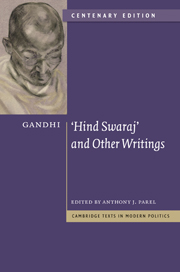Book contents
- Frontmatter
- Contents
- Preface to the centenary edition
- Acknowledgements
- Editor's introduction to the centenary edition
- Editor's introduction to the 1997 edition
- A note on the history of the text
- Principal events in Gandhi's life
- Biographical synopses
- Guide to further reading
- Glossary and abbreviations
- HIND SWARAJ
- SUPPLEMENTARY WRITINGS
- Bibliography
- Index
Editor's introduction to the centenary edition
Published online by Cambridge University Press: 05 October 2014
- Frontmatter
- Contents
- Preface to the centenary edition
- Acknowledgements
- Editor's introduction to the centenary edition
- Editor's introduction to the 1997 edition
- A note on the history of the text
- Principal events in Gandhi's life
- Biographical synopses
- Guide to further reading
- Glossary and abbreviations
- HIND SWARAJ
- SUPPLEMENTARY WRITINGS
- Bibliography
- Index
Summary
The framing of its argument makes Hind Swaraj an original work of modern Indian political philosophy. The argument is that India is in need of a systemic transformation – political, economic, ethical, aesthetic and spiritual. Being systemic in nature and affecting key aspects of national life, these transformations, if they are to succeed, should take place more or less simultaneously. Politics, economics, ethics, aesthetics and spirituality, according to Gandhi, should operate interactively and not in isolation from one another.
The argument for this is made in light of the theory of the ‘canonical aims of life’ (purusharthas) (see below). The use of this Indian intellectual framework makes Hind Swaraj the first text of modern Indian political philosophy. As such, it marks the beginning of the emancipation of the modern Indian political mind from dependency on Western frameworks for understanding India and its problems.
The argument hinges on four major themes – nationalism, civilisation, satyagraha and swaraj (the themes of ‘machinery’ or technology and education being subsumed under civilisation). Before we examine the way they are analysed, we need to mention briefly the book's dialogue form, and the historical identity of those engaged in the dialogue.
- Type
- Chapter
- Information
- Gandhi: 'Hind Swaraj' and Other Writings , pp. xiv - xxivPublisher: Cambridge University PressPrint publication year: 2009



